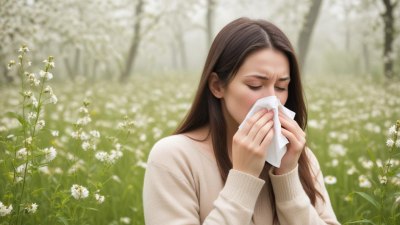Why Seasonal Allergies Secretly Shape Your Outdoor Plans
Understanding how seasonal allergies can impact your outdoor activities and plans.

This image was created with the assistance of Freepik
Seasonal allergies affect millions of people every year, and while they may seem like a minor inconvenience, they can significantly shape your outdoor activities and plans. When spring arrives, the blooming flowers and budding trees bring joy to many, but for allergy sufferers, it means a season of discomfort and avoidance. Understanding how seasonal allergies impact your lifestyle can help you better navigate your outdoor plans and find ways to enjoy nature without compromising your health.
The Science Behind Seasonal Allergies
Seasonal allergies, also known as hay fever or allergic rhinitis, occur when the immune system overreacts to allergens in the environment. These allergens can include pollen from trees, grasses, and weeds, as well as mold spores and dust mites. The body's immune response triggers inflammatory reactions, leading to symptoms such as sneezing, runny or stuffy nose, itchy eyes, and fatigue. Understanding these symptoms is crucial for planning outdoor activities during peak allergy seasons.
Identifying Allergy Triggers
One of the keys to managing seasonal allergies is identifying specific triggers. Pollen counts vary throughout the year, depending on the types of plants in your area and their flowering seasons. For example, tree pollen is most prevalent in early spring, grass pollen dominates late spring, and weed pollen spikes in late summer and fall. By staying informed about the pollen calendar in your area, you can make more informed decisions about when to plan outdoor events.
Seasonal Allergies and Outdoor Activities
Seasonal allergies can drastically affect your outdoor plans. For those who love hiking, biking, or enjoying picnics in the park, high pollen counts can mean trading these activities for indoor alternatives. It's essential to adapt your plans based on pollen forecasts. For instance, consider scheduling outdoor activities in the early morning or late afternoon, when pollen counts tend to be lower. Additionally, locations that are less dense with vegetation, such as beaches or urban areas, may offer respite from allergens.
Outdoor Events and Seasonal Allergies
If you're planning events such as weddings, family reunions, or outdoor concerts during allergy season, it's vital to consider your guests' comfort. Providing shaded areas, seating indoors, or scheduling events during times of day when pollen exposure is reduced can help minimize allergic reactions. Furthermore, offering allergy-friendly options like foods free from common allergens can enhance comfort for all attendees.
Maintaining Quality of Life
Managing seasonal allergies is crucial for maintaining quality of life. Long-term exposure to allergens can lead to chronic issues such as sinus infections or asthma exacerbations. Simple prevention strategies, such as using air purifiers, keeping windows closed, and showering after spending time outdoors, can significantly reduce symptoms. Over-the-counter antihistamines and nasal corticosteroids can provide relief as well, allowing allergy sufferers to engage in outdoor activities with more ease.
Planning Outdoor Activities Wisely
To combat the impact of seasonal allergies on your plans, proactive strategies are key. Here are a few actionable steps to take: 1. Check pollen forecasts regularly and plan outdoor activities when counts are lower. 2. Opt for low-allergen destinations or consider indoor alternatives when counts are high. 3. Stay hydrated and keep your immune system robust by maintaining a healthy diet full of fruits, vegetables, and omega-3 fatty acids. 4. Wear sunglasses and masks to minimize exposure to pollen, particularly on windy days.
Long-term Solutions for Managing Seasonal Allergies
For those who suffer from chronic seasonal allergies, consulting with an allergist can provide personalized solutions. Options such as allergy shots (immunotherapy) can help desensitize your body to specific allergens over time, potentially reducing your symptoms significantly. Another approach could be lifestyle adjustments, including relocating to areas with lower pollen levels or incorporating air filtration systems in your home to keep indoor environments allergen-free.
Lifestyle Adjustments for Allergy Management
Living with seasonal allergies often requires lifestyle changes. In addition to actively managing exposure, consider revamping your home environment: invest in hypoallergenic bedding, vacuum frequently with a HEPA filter, and regularly wash curtains and upholstery. You can also limit outdoor activities during peak pollen seasons; simple habit adjustments can lead to a more enjoyable outdoor experience.
Recognizing the Social Impact of Seasonal Allergies
Seasonal allergies can sometimes lead to social isolation, particularly if you’re avoiding outdoor events or activities that you used to enjoy. Current trends show that more people are recognizing the social implications of allergies; communities can step up by organizing allergy-friendly events. Communities can find ways to accommodate allergy sufferers, fostering inclusivity while promoting awareness of this common condition.
Incorporating Nature into Your Life While Managing Allergies
For nature lovers, finding ways to incorporate nature into your life without triggering allergies is essential. You might consider indoor gardening, which allows you to enjoy plants without the adverse effects of pollen. Further, participating in programs that promote native plant growth while providing your community with information about allergy management can be rewarding and beneficial.
Staying Informed and Connected
The first step in managing seasonal allergies is recognizing that you’re not alone. Connecting with others who share your experiences, whether through support groups or online forums, can provide motivation, shared strategies, and emotional support. Additionally, staying informed through reliable sources such as the American Academy of Allergy, Asthma, and Immunology can empower you to take control of your allergies.
Enjoying the Outdoors Despite Seasonal Allergies
Understanding how seasonal allergies can impact your outdoor plans is essential for both physical comfort and emotional well-being. With strategic planning, lifestyle adjustments, and informed decisions, it’s possible to enjoy the beauty of nature even amidst the plight of allergies. Embracing your passion for the outdoors may require some flexibility, but by actively managing exposure through various coping strategies, you can still create lasting memories while maintaining your health. Remember, seasonal allergies don’t have to dictate your life; instead, they can encourage you to be more mindful and creative in how you engage with the world around you.











